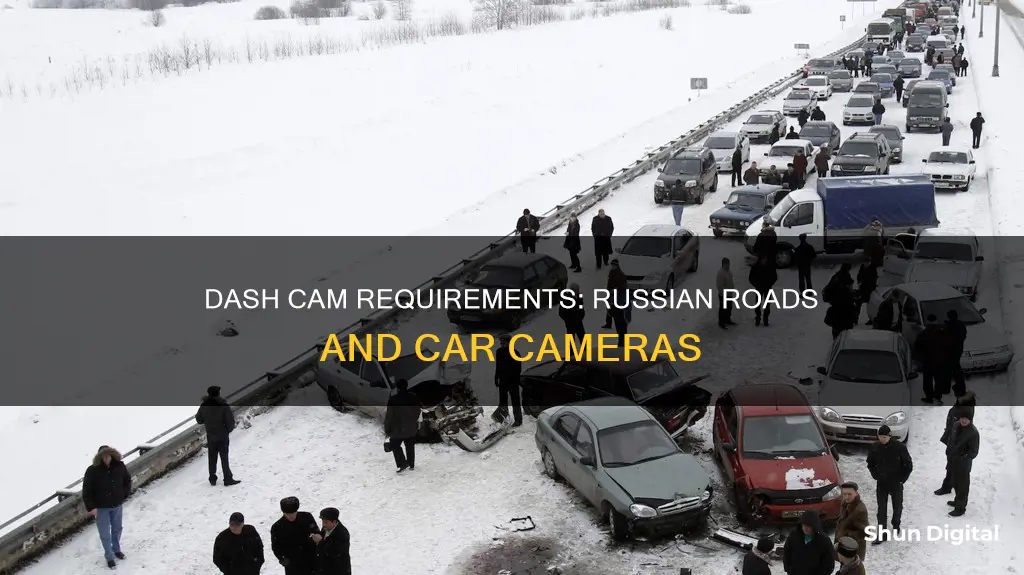
Although dash cameras are not a legal requirement in Russia, they are extremely popular among motorists. The sheer size of the country, combined with a legal system that rarely favours first-hand accounts of traffic collisions, has made dash cams a common feature in Russian cars. The cameras are used to ensure justice when it comes to proving accidents on the roads, as insurance companies are known to deny claims with little evidence, and witnesses are often unhelpful.
| Characteristics | Values |
|---|---|
| Are dash cameras required in Russia? | No, but they are very popular. |
| Why are they so popular? | Lax law enforcement, high levels of insurance fraud, and a legal system that rarely favours first-hand accounts of traffic collisions. |
| How many motorists have dash cameras? | It is estimated that one million Russian motorists have installed dash cameras in their cars. |
| What do the cameras cost? | Between $50 and $200. |
What You'll Learn

Dash cams are not required by law
While dash cams are extremely popular in Russia, they are not required by law. In fact, dash cams are mostly devices for police officers and highway patrol in the US. However, in Russia, an estimated one million motorists have installed dash cams in their cars. The main reason for this is to ensure justice when it comes to proving accidents on the road.
Russia has lax law enforcement, and its legal system rarely favours first-hand accounts of traffic collisions. There is also a culture of scams on the road, including staged crashes and false accusations. As a result, insurance companies have begun to crack down on claims, often denying any claim with little evidence. Dash cams provide hard evidence in these situations, and footage can be pulled off and used later if an accident occurs.
The sheer size of the country, with its perilous road conditions, also makes dash cams a sensible choice for Russian motorists. There are large, lawless areas, and the police have a penchant for extortion. The Russian Highway Patrol is notorious for brutality, corruption, extortion and making an income from bribes. In addition, Russian drivers are accident-prone, with 35,972 road deaths in 2007, averaging 25.2 traffic fatalities per 100,000 people.
The popularity of dash cams in Russia can also be attributed to the inexpensive cost of the technology. Dash cams are much cheaper than insurance, ranging from as little as $50 to $200. In addition, regulations passed by the Interior Ministry in 2009 removed any legal hurdles for in-dash cameras, making it easy for drivers to install the equipment.
Transferring Camera Photos: Do You Need Wi-Fi?
You may want to see also

They are popular to avoid insurance fraud
Although dash cams are not a legal requirement in Russia, they are extremely popular among Russian motorists. One of the main reasons for their popularity is to avoid insurance fraud.
Russia has a high rate of road traffic accidents and fatalities. In 2007, there were 35,972 road deaths, which averages out to 25.2 traffic fatalities per 100,000 people. This is significantly higher than the US, which had 13.9 road deaths per 100,000 people in the same year, despite having six times more cars.
In this context, insurance fraud is common. Dash cam footage can be used as evidence to prevent false accusations and scams. For example, pedestrians may throw themselves onto car bonnets to fake dangerous driving and win an insurance payout. In other cases, drivers may deliberately slam on their brakes to cause the car behind to crash into them, in the hope of claiming insurance money. Dash cam footage can be used to prove that these accidents were deliberate and not the result of poor driving.
The Russian legal system rarely favours first-hand accounts of traffic collisions, and Russian courts are known to be sceptical of verbal claims. Dash cam footage provides hard evidence that can be used in court to substantiate claims and counter false accusations. It can also be used to protect against scams and extortion attempts, such as when a crowd of "witnesses" pressures a driver to pay up cash on the spot after a deliberately staged accident.
The popularity of dash cams in Russia can be attributed in part to the low cost of the technology. A combination of inexpensive cameras, flash memory, and regulations passed by the Interior Ministry in 2009 that removed legal barriers to in-dash cameras has made it easy and affordable for Russian drivers to install dash cams in their vehicles.
Beverly Hills Camera Tickets: What You Need to Pay
You may want to see also

They are useful in the event of a hit and run
Although not a legal requirement, dash cams are incredibly useful in the event of a hit-and-run incident. They are an invaluable witness, capturing every crucial second of an accident. In the stressful moments after a collision, it can be difficult to recall all the details accurately, but a dash cam will record the seconds leading up to and following an impact. This footage can be used to establish the sequence of events, vehicle speeds, driver behaviour, and other contributing factors. This is especially important in Russia, where law enforcement is often lax and corrupt, and the legal system rarely favours firsthand accounts of traffic collisions.
Dash cam footage can also help to expedite the insurance claims process. Insurance companies can quickly assess liability for vehicle damage, and dash cams can also help to prevent fraudulent insurance claims. In the event of a hit-and-run, dash cam footage can provide solid evidence of what occurred, helping to protect drivers from false accusations and staged accidents.
The size of Russia and the high number of road fatalities also make dash cams a sensible precaution. With so many accidents occurring, it's important to have a reliable witness that can provide an unbiased account of events. This can help to protect drivers and their loved ones, and ensure that those responsible for accidents are held accountable.
In addition to their use in hit-and-run incidents, dash cams can also provide peace of mind for drivers in other situations. They can help to prevent insurance fraud, deter theft or vandalism, and even improve driving behaviour in young or new drivers. With their ability to capture unbiased evidence, dash cams can be a powerful tool for road safety and accident prevention.
The Most Priceless Camera Ever Made
You may want to see also

They can prevent police corruption
While dashcams are not a legal requirement in Russia, almost every motorist has one. This is partly due to the country's lax and often corrupt law enforcement, as well as a legal system that rarely favours first-hand accounts of traffic collisions.
Dashcams can be an effective tool in preventing police corruption. The presence of a dashcam can have a de-escalating effect on confrontational situations, as citizens are aware that their actions are being recorded and they will not be able to fabricate a story later. In a survey, half of the officers questioned said that they had been able to de-escalate situations by explaining to drivers that the interaction was being recorded. This was corroborated by a separate survey of citizens, where half acknowledged that their behaviour towards officers would change if they knew a camera was involved.
Video evidence from dashcams can also be used to exonerate officers from false or misleading complaints. According to the International Association of Chiefs of Police, officers are exonerated 93% of the time when video evidence is available. This makes dashcams an active form of protection for law enforcement officers.
Additionally, dashcams can be used as a tool for training officers. Footage can be reviewed to determine if officers could have conducted themselves better or resolved a situation more effectively. This allows police departments to improve their practices and reduce instances of corruption.
Overall, while not a legal requirement, the prevalence of dashcams in Russia can help to prevent police corruption by providing a record of interactions, deterring false complaints, and improving police practices through training and review.
The Magic Behind Auto-Focusing Cameras
You may want to see also

They capture unique footage
Dashcams are not a legal requirement in Russia, but they are extremely popular. One source estimates that one million Russian motorists have installed dashcams in their cars. This popularity has led to a plethora of unique footage being captured and uploaded to the internet.
The content of these videos varies wildly. On the one hand, there are videos of terrible car crashes, road rage, and even wild animals appearing out of nowhere. On the other hand, there are videos of motorists helping old ladies cross the road, cars stopping in front of cats and dogs, and drivers helping each other in tough situations.
Some of the footage captured is truly once-in-a-lifetime. In 2013, a meteorite blazed through the sky over the Russian city of Chelyabinsk, and dozens of Russian drivers captured the fiery space debris on their dashcams. The videos show the meteorite falling gracefully towards Earth, with amazed filmers either too shocked to say anything or swearing profusely in the background.
Another viral video shows a man confronting the driver of the car behind him, only to be beaten up by a group of costumed characters, including SpongeBob SquarePants.
The sheer size of Russia, combined with often corrupt law enforcement and a legal system that rarely favours first-hand accounts of traffic collisions, has made dashcams extremely popular among Russian motorists. The cameras are seen as a way to ensure justice when it comes to proving accidents on the road and protecting oneself from false accusations, insurance scams, and corrupt police officers.
Charging the DJI Osmo Action Camera: A Quick Guide
You may want to see also
Frequently asked questions
No, but dash cams are extremely popular in Russia.
Lax law enforcement, a high number of road accidents, and a legal system that often requires hard evidence means dash cams are seen as a necessity by many Russian motorists.
Russian dash cams have recorded everything from meteorites to road accidents, insurance scams, and violent confrontations.







